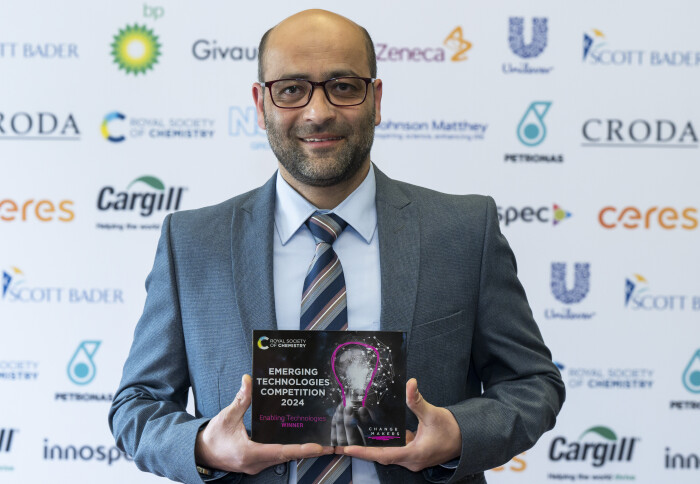Chemical Engineering team wins prestigious RSC award

The Royal Society of Chemistry (RSC) Emerging Technologies Competition had six competitors from Higher Education pitch for a coveted prize.
The Orthogonal Peptides team, led by Dr Othman Al Musaimi, Honorary Research Fellow within the Department of Chemical Engineering at Imperial College London, fended off strong competition from reputed companies to secure a win within their category ‘Enabling Technologies’, as they endeavour to launch their technology as a spinout.
The winners were awarded at a prestigious ceremony on 4 July.
Orthogonal Peptides: a journey
Orthogonal Peptides have innovated solid-phase peptide synthesis (SPPS) to allow the synthesis of multiple peptide fragments on a single bead, departing from the conventional method of synthesising only one fragment per bead.
This advancement promises to significantly boost the productivity of existing peptide analogues and facilitate the synthesis of first-in-class analogues.
Orthogonal Peptides, an emerging spinout company from Imperial, is very excited to have our revolutionary new technology for peptide synthesis that Othman created, acknowledged by the RSC with this prestigious award.
Professor Daryl Williams, co-lead, Department of Chemical Engineering
Their goal is to advance the development of more orally available peptide therapeutics, which is preferred both by patients and from a regulatory standpoint.
Spinning out the tech
Orthogonal Peptides have developed a ground-breaking technology that has the potential to revolutionise the peptide manufacturing process. Their technology significantly reduces waste production and manufacturing times while enhancing plant utilisation.
This advancement promises to substantially increase the productivity of existing peptide analogues and facilitate the synthesis of first-in-class analogues, making oral peptide therapies more widely available.
Moving forward, the vision for Orthogonal Peptides is to look towards advancing the field of peptides and introducing first-in-class peptide therapeutics to address ongoing medical needs.
Significantly, the global pharmaceutical industry has experienced remarkable growth, with peptides becoming important therapeutic agents. Insulin is a well-known example of such a therapeutic peptide.
Orthogonal Peptides is currently leading an industrial consortium with AstraZeneca, Novo Nordisk, and Almac, in collaboration with the Centre for Process Innovation (CPI), to raise £2M through Innovate UK. They are also seeking a seed investment of £6M to launch their business and begin developing novel peptide therapeutics for various applications.
Dr Othman Al Musaimi is also a Lecturer in Medicinal Chemistry at Newcastle University.
Article text (excluding photos or graphics) © Imperial College London.
Photos and graphics subject to third party copyright used with permission or © Imperial College London.
Reporter
Navta Hussain
Department of Chemical Engineering
